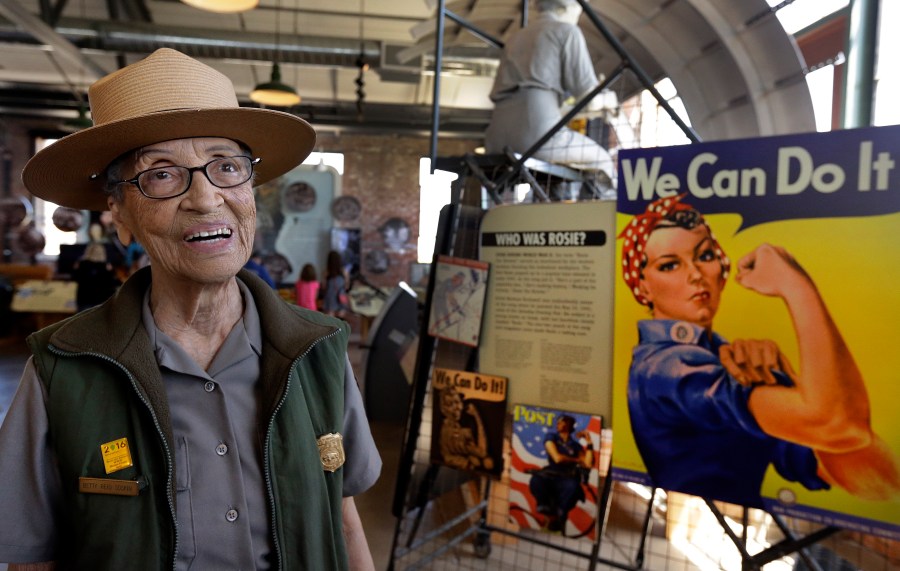Betty Reid Soskin, the country’s oldest active ranger in the National Park Service, retired Thursday at 100 years old.
Over the past decade and a half, Soskin has shared with parkgoers her personal experiences and the efforts of women from diverse backgrounds who worked on the World War II Home Front. She has led tours and public programs, sharing her experiences and observations at the Rosie the Riveter WWII Home Front National Historical Park in Richmond.
Soskin, who celebrated her 100th birthday in September, spent her last day providing an interpretive program to the public and visiting with coworkers, according to a statement from the Park Service.
“To be a part of helping to mark the place where that dramatic trajectory of my own life, combined with others of my generation, will influence the future by the footprints we’ve left behind has been incredible,” the ranger said.

Soskin’s interpretive programs at the Richmond park have illuminated the histories of African Americans and other people of color, and her efforts demonstrate how her work has impacted the way the Park Service conveys such history to audiences across the U.S., the agency said.
“Betty has made a profound impact on the National Park Service and the way we carry out our mission,” Park Service Director Chuck Sams said in a written statement. “Her efforts remind us that we must seek out and give space for all perspectives so that we can tell a more full and inclusive history of our nation.”
In the early 2000s, Soskin participated in scoping meetings with the City of Richmond and the National Park Service to develop the general management plan for Rosie the Riveter/WWII Home Front National Historical Park. She worked with the park service on a grant funded by Pacific Gas & Electric to uncover untold stories of African Americans on the home front during WWII, which led to a temporary position working with the service at the age of 84.
“Being a primary source in the sharing of that history – my history – and giving shape to a new national park has been exciting and fulfilling,” Soskin said. “It has proven to bring meaning to my final years.”

In 2011, Soskin became a permanent National Park Service employee and has since been leading public programs and sharing her personal remembrances and observations at the park visitor center.
Later, in 2015, she was selected by the park service to participate in a national tree-lighting ceremony in at the White House and to introduce President Barack Obama in the nationwide telecast.
Soskin suffered a stroke in 2019 and spent months in physical therapy. She returned to work in 2020, just before the COVID-19 pandemic hit.
The century-old ranger grew up in a Cajun-Creole, African American family that settled in Oakland after a 1927 flood devastated New Orleans, according to her biography. Her family “followed the pattern set by the black railroad workers who discovered the West Coast while serving as sleeping car porters, waiters, and chefs for the Southern Pacific and Santa Fe railroads: they settled at the western end of their run where life might be less impacted by southern hostility.”
In a 2015 interview with the U.S. Department of the Interior, Soskin said her great-grandmother was born into slavery in 1846 and lived to be 102.
During World War II, Soskin worked in a segregated union hall as a file clerk. In 1945, she and her husband, Mel Reid, founded one of the first Black-owned music stores, Reid’s Records, which closed in 2019.
Soskin has also held positions as staff to a Berkeley city council member and as a field representative serving West Contra Costa County for two members of the California State Assembly.
Rosie the Riveter/World War II Home Front National Historical Park will celebrate Betty’s retirement on April 16. Details can be found on the park’s website.
Learn more about Soskin’s story and watch her recorded programs.













